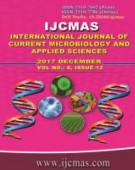


 National Academy of Agricultural Sciences (NAAS)
National Academy of Agricultural Sciences (NAAS)

|
PRINT ISSN : 2319-7692
Online ISSN : 2319-7706 Issues : 12 per year Publisher : Excellent Publishers Email : editorijcmas@gmail.com / submit@ijcmas.com Editor-in-chief: Dr.M.Prakash Index Copernicus ICV 2018: 95.39 NAAS RATING 2020: 5.38 |
Capturing of atmospheric carbon (C) and storing it in the terrestrial biosphere is one of the mitigation options for greenhouse gas reduction. Perennial systems like plantation crops can also be suitable candidates for carbon sequestration. Coconut plantations, for example, not only give sustainable production, but also serve as a good system for biomass production and carbon accumulation. Coconut as a perennial tree crop with 50 to 60 years of lifespan, has a great potential as a carbon sink for mitigating climate change. The objective of this study is to identify the main characteristics of coconut plantation (area of coverage, size of holding, Type and Age of coconut plantation, Management aspects etc.) in the western zone of Tamil Nadu. This study was conducted in the Agro Climatic Research Centre during 2016-17. The western zone (Coimbatore, Tirupur and Erode districts) of Tamil Nadu was divided into 5 km grid and area of coconut is worked out for each grid namely <25%, 25-50%, 50-75% and >75% using coconut area map developed by the Dept. of remote sensing & GIS, TNAU, Coimbatore. A field survey was conducted by Agro Climate Research Centre, TNAU, Coimbatore in the western zone of Tamil Nadu during 2016-17. Out of 61 coconut growers selected in this study, nearly 37% of lands were classified under the category of 6 -10 acres, followed by 32% by 0-5 acres. 13%, 10% and 8% classified under the category 11-15, >=20 and 15-20 acres respectively. As per the Coconut survey, 91% of the coconut plantation is tall type and 9% is dwarf type. Out of tall type, 36% coconut plantation was with an age of 20 - 30 years followed by 27% with an age of 10 - 20 years followed by 22% with age of 30-40 years. Remaining 15% came under the category 0-10, 40-50 and 50-60 years 9%, 2% and 4% respectively. Out of dwarf type, 70% of coconut plantation was with age of 5-10 years followed by 19% with 0-5year and 11% with 10-15 years. Out of total coconut palms surveyed, 95% coconut plantation was cultivated with conventional method whereas 5% was cultivated with organic method.
 |
 |
 |
 |
 |